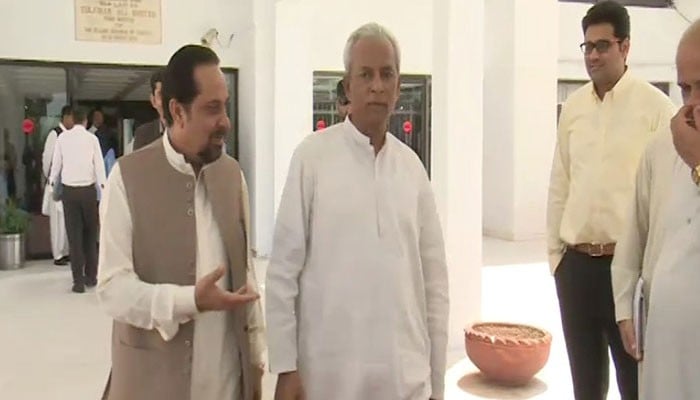Supreme Court to indict Nehal Hashmi for contempt on July 10
Bench expresses displeasure over Hashmi's absence in court
June 23, 2017
ISLAMABAD: The Supreme Court expressed displeasure on Friday over the absence of Senator Nehal Hashmi during hearing of contempt proceedings against him.
At the start of proceedings, Hashmi’s counsel informed the court that his client has gone to Saudi Arabia to perform Umrah and thus could not make it to the hearing.
Justice Ejaz Afzal Khan, who heads the three-member special bench which initiated contempt proceedings against him after his recent controversial remarks, expressed displeasure at Hashmi’s absence. He said the contemnor [Hashmi] should have informed the court of his intent to perform Umrah.
Justice Ejaz also informed Hashmi’s counsel that the bench is dissatisfied with their reply to the contempt notice.
In his order, the judge further observed that Hashmi would be indicted at the next hearing on July 10.
At the last hearing on Tuesday, Hashmi submitted a 19-page reply through his lawyer, Hashmat Habib, telling the court that his speech was aired nonstop by the media, creating a hostile environment for him.
In his reply, Hashmi stated that Pakistan Tehreek-e-Insaf Chairperson Imran Khan highlighted the speech and presented the remarks made in it out of context. Hashmi believed the incident to be a tactic played by his political rivals, as he "cannot even imagine to slander the judiciary".
While defending his stance on respecting the judiciary, Hashmi stated he is associated with the profession of law since the past 30 years and also stood by the judiciary during the 2007 lawyers' movement.
The proceedings against Hashmi started after a video surfaced on the social media in which the senator was seen threatening those probing the Sharif family in the Panama case, i.e. the judiciary. He was the Pakistan Muslim League-Nawaz (PML-N) Sindh secretary-general when he made the speech.
Later, Hashmi was expelled by the PML-N leadership and directed to resign from the Senate, however, he refused to comply with the resignation orders.













